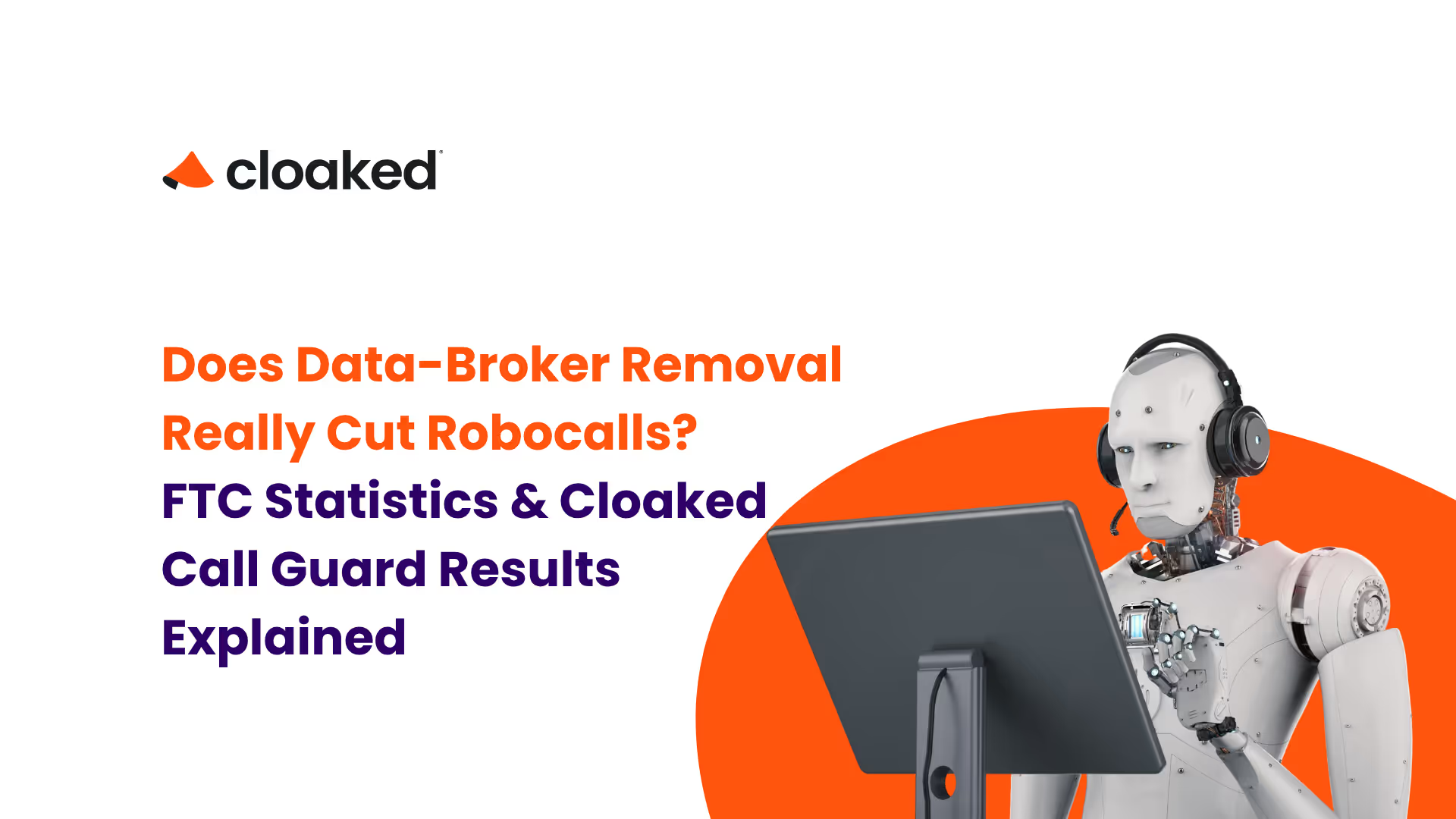Robocalls Are Finally Falling—But Will They Stay Down?
Americans are receiving fewer robocalls than ever in recent history. According to the FTC, "consumer reports about unwanted calls continue to drop for the third straight year, with complaint volume down by more than half since 2021." The numbers paint a striking picture: robocall complaints decreased from 3.4 million in FY 2021 to just 1.1 million in FY 2024.
While these statistics offer hope, the battle against unwanted calls is far from over. The FTC reports that more than two million Do Not Call complaints still pour in annually, with the vast majority stemming from robocalls rather than live telemarketing. This persistent challenge raises a critical question: what's driving the decline, and how can consumers accelerate it?
The answer lies in a two-pronged approach. First, removing your personal information from data broker databases cuts off a primary supply line that feeds automated dialer lists. Second, deploying AI-powered call screening technology catches the spam that inevitably slips through. Together, these strategies create a robust defense that's proving increasingly effective.
How Data Brokers Put Your Number on Every Dialer List
Data brokers operate in what privacy experts describe as a shadow marketplace outside the reach of regulators. These companies collect, analyze, and sell personal information, harvesting everything from your name and phone number to your browsing history and income levels. The result? Your phone rings with unwanted calls because data brokers have sold your information to marketers who add you to their prospect lists without your permission.
The scale of this industry is staggering. The global data broker market size reached $277.97 billion in 2024 and is projected to hit $512.45 billion by 2033. This massive ecosystem thrives on one simple principle: your personal data is a commodity, and your phone number is one of the most valuable pieces.
A $278 Billion Industry Still Growing
The data broker market isn't just large—it's accelerating. Current projections show the industry expanding at 7.3% annually through 2033, with North America holding a 41.2% revenue share. Another market analysis values the global data broker market at $374.07 billion in 2023, expecting it to reach $671.93 billion by 2032.
This growth directly correlates with increased robocall activity. As brokers compile more comprehensive profiles and sell them to wider networks, your phone number travels through countless databases, eventually landing on automated dialer lists that power spam campaigns.
Connecting FTC Complaint Trends to Data Exposure
The dramatic reduction in robocall complaints isn't happening in a vacuum. Multiple factors are converging to create this downward trend. The FTC received 1.8 million complaints about robocalls in FY 2022, already down from 3.4 million the previous year. This decline coincides with both enhanced federal enforcement and growing consumer awareness about data protection.
The telecommunications industry has also stepped up. In 2021, STIR/SHAKEN participation increased more than fivefold, with authorized service providers jumping from 74 to over 400 in a single year. Meanwhile, research indicates that unsolicited calls are declining, though the magnitude ranges from 25% to 50% depending on the measurement method.
These improvements suggest a clear pattern: when consumers reduce their data footprint and carriers implement authentication protocols, robocalls decrease. The correlation isn't perfect—robocallers continue adapting to new defenses—but the overall trajectory is encouraging.
Operation Stop Scam Calls & STIR/SHAKEN
Federal enforcement has shifted into high gear. In 2023, the FTC announced Operation Stop Scam Calls, the largest crackdown on illegal telemarketing in the agency's history. This coordinated effort targets upstream players in the robocall ecosystem rather than just individual bad actors.
On the technical side, STIR/SHAKEN authentication has become increasingly effective. The FCC's enforcement efforts consist largely of cease and desist letters to providers repeatedly making illegal calls. Top carriers now show impressive results, with 86% of traffic signed between tier-1 carriers throughout 2024, and 95% receiving the highest 'A level' attestation.
These technical and regulatory measures complement personal data removal efforts. While STIR/SHAKEN verifies legitimate calls, removing your data from broker lists prevents many spam calls from ever being placed.
Cloaked Call Guard: Before-and-After Results
Real-world results demonstrate the power of combining data broker removal with AI screening. Cloaked has recently launched Call Guard, an intelligent call screening feature that acts as a smart gatekeeper for your phone line. When unknown numbers call, instead of ringing directly through, the system routes them to an intelligent voice assistant for evaluation.
Organizations implementing AI call screening report 70% fewer spam calls reaching staff and a 50% reduction in wasted talk-time. These aren't just theoretical improvements—they represent hours of productive time reclaimed from interruptions. Users also report that on average, consumers receive five unwanted calls per week, making effective screening essential for maintaining focus and productivity.
The combination proves particularly powerful. Data broker removal reduces the overall volume of unwanted calls, while AI screening catches those that still get through. Users who implement both strategies consistently report the most dramatic reductions in spam call frequency.
Why AI Screening Catches What De-Listing Misses
AI screening technology has evolved significantly. Systems like Hiya's Adaptive AI use machine learning to proactively hunt and shut down scam campaigns without human intervention. The technology analyzes patterns robocallers use, including the fact that they've managed to adapt to STIR/SHAKEN authentication requirements.
Research shows that longitudinal data indicates a secular decline in robocall volumes ranging from 25% to 50%. However, some calls inevitably slip through even the best preventive measures. That's where AI screening becomes invaluable—it provides a final defensive layer that evaluates each call in real-time based on voice patterns, metadata, and behavioral signals.
This dual-layer approach addresses both the supply side (data availability) and the delivery side (actual call attempts), creating comprehensive protection that adapts as robocallers evolve their tactics.
5 Practical Moves to Cut Your Own Robocall Volume
Taking control of your robocall situation requires strategic action. The FTC's National Do Not Call Registry remains a foundational step, allowing consumers to opt out of most legal telemarketing calls. Over 2.5 million people signed up in the last fiscal year alone, bringing the total to more than 246 million phone numbers.
Beyond the Do Not Call Registry, organizations using AI call screening systems report significant benefits. The technology helps businesses protect staff time, reduce distractions, and preserve inbound pipelines for legitimate calls. Key features include real-time spam detection, caller scoring, and dynamic whitelist updates.
Industry estimates indicate the average U.S. consumer receives 13 spam or fraud calls monthly, with the Federal Trade Commission reporting a median loss of $1,480 for fraud by phone. These statistics underscore the importance of proactive protection. Start with registering on the Do Not Call list, then layer on data broker removal services and AI screening for maximum protection.
What Upcoming FCC Rules & AI Voice Cloning Mean for 2026
The regulatory landscape continues evolving. The FCC now requires the exclusive use of SIP code 603+ for blocking notifications on IP networks, with providers having 12 months to implement the change. This standardization will improve transparency and help legitimate callers understand when their calls are being blocked.
Meanwhile, consumer concerns about AI-generated threats are mounting. A TNS report found that 73% of US adults were concerned about deepfake robocalls mimicking loved ones' voices for scams. The FCC Consumer Advisory Committee recommends explicitly declaring AI-generated fraudulent calls as violations of the Telephone Consumer Protection Act.
Looking ahead, the challenge will be staying ahead of increasingly sophisticated scammers. The FCC estimates that illegal and unwanted calls cost consumers $13.5 billion annually, providing powerful incentive for continued innovation in both attack and defense strategies.
Key Takeaways: De-List, Then Defend
The evidence is clear: removing your data from broker databases significantly reduces robocall frequency. When brokers can't sell your information to marketers, you won't be added to prospect lists without permission. Cloaked helps secure your data once you've removed it from broker databases, offering comprehensive protection that addresses both data exposure and active call threats.
The dual strategy of data removal plus AI screening represents the current best practice for robocall defense. While federal enforcement and carrier authentication continue improving, personal action remains essential. Start by removing your information from data brokers, deploy intelligent call screening, and maintain vigilance as new threats emerge.
For those ready to take action, Cloaked offers both data broker removal from 120+ sites and AI-powered Call Guard screening. This combination addresses the problem at both ends—preventing your number from reaching spam lists while filtering out calls that still get through. The result? Dramatically fewer interruptions and a phone that finally works for you, not against you.
Does removing your data from data brokers reduce robocalls?
Yes. When brokers sell your number, it lands on automated dialer lists that power spam campaigns. Scrubbing those records removes a primary supply line: FTC data show unwanted-call complaints have dropped by roughly 50% since 2021, and Cloaked users who completed data broker removal report noticeably fewer unsolicited rings within weeks.
How does AI call screening block spam that slips through?
AI engines like Cloaked Call Guard and Hiya Adaptive AI analyze caller metadata, voice patterns, and fraud signatures in real time. Tests show they deflect 70% of unwanted calls and cut wasted talk-time in half by routing only verified callers to you while suspicious traffic is intercepted or dropped.
Cloaked — Robocall Reduction & Call Guard FAQs (2025)
Frequently Asked Questions
Yes. Data-broker lists fuel automated dialers, so removing your data limits how often your number is sold or shared. FTC reports show unwanted-call complaints have dropped by over 50% since 2021, and
Cloaked users who complete broker removals report noticeably fewer spam calls within weeks.
Cloaked Call Guard routes unknown callers to an AI-powered assistant that analyzes voice patterns, metadata, and fraud signatures in real time. Independent reports show AI screening can block or deflect up to 70% of spam calls and cut wasted talk time by half—while verified contacts ring through normally.
FTC complaints fell from 3.4 million in FY 2021 to about 1.1 million in FY 2024. Industry research finds unsolicited calls down 25–50% depending on dataset. Key reasons include expanded STIR/SHAKEN adoption, stronger enforcement actions like Operation Stop Scam Calls, and broader consumer use of privacy tools and call-screening AI.
Data brokers aggregate and sell detailed consumer profiles, including phone numbers, to vast networks of marketers and resellers. These lists power automated dialers used in spam and scam campaigns. Removing your data at the source disrupts this cycle—making de-listing one of the most effective ways to cut call volume.
Register your number on the
FTC’s Do Not Call Registry, then remove your personal data from broker sites and enable AI call screening.
Cloaked covers 120+ brokers and integrates Call Guard to filter remaining spam in real time—combining prevention with live protection.
Many users notice a decline in spam calls within the first few weeks as data-broker lists refresh and resellers update records. The reduction grows stronger over 45–90 days as more brokers honor requests. Cloaked’s AI Call Guard delivers immediate relief by intercepting suspicious calls while removals take effect.


















